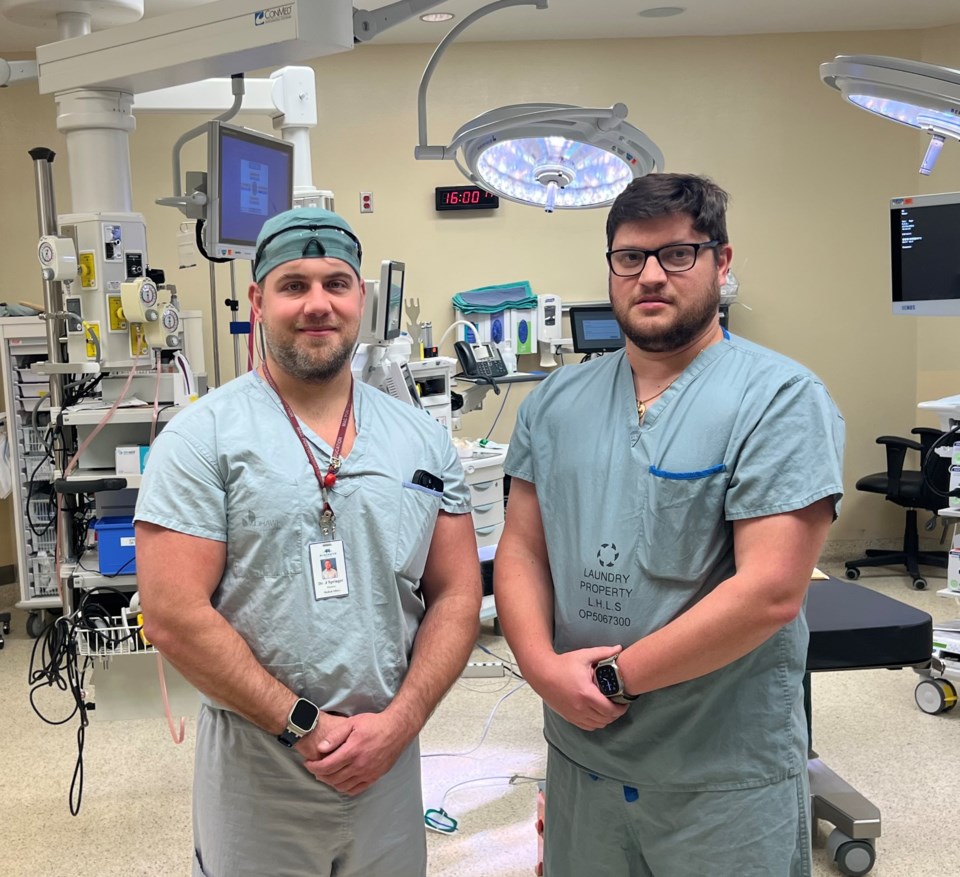A specialized surgery for rectal cancer was performed for the first time at Bluewater Health this month, officials say.
The procedure — a Transanal Total Mesorectal Excision (TaTME) — was successfully led by general and colorectal surgeon, Dr. Jeremy Springer, and general surgeon, Dr. Colin Way, along with the hospital’s surgical team.
“I am so proud of our surgical team for venturing into new frontiers of surgery,” hospital Chief of Staff, Dr. Michel Haddad said in a news release. “Such efforts are only possible with innovation, collaboration, dedication and expertise.”
TaTME, also known as 'bottom-up' surgery, is a new minimally invasive alternative to conventional surgery for patients with low rectal cancer. The surgery allows for faster recovery, less pain and time in hospital, and also lowers the chances of post-operative complications, Bluewater Health noted, adding that the procedure requires ‘significant expertise and teamwork’ to achieve the desired goals.
Previously, local patients requiring this procedure had to travel to other tertiary centres beyond London in order to receive this level of specialized care.
“Surgeons are required to have specialized training to perform this innovative procedure, and so we are thrilled to have Dr. Springer and Dr. Way here at Bluewater Health to provide these specialty services locally.”
In 2023, cancer treatment options available locally were expanded thanks to the successful recruitment of Dr. Springer, who had completed his fellowship in minimally invasive colon and rectal surgery at the University of Massachusetts.
The hospital also invested in specialized instrumentation needed to treat patients with early stage rectal cancer, and the Transanal Minimally Invasive Surgery (TAMIS) procedure was introduced.
Since inception, seven patients have benefitted from the TAMIS procedure locally.
March is also Colorectal Cancer Awareness Month, the hospital added. While colorectal cancer is the second leading cause of cancer-related death in Canada, it is preventable, treatable, and beatable.
“When colorectal cancer is detected early, patients have more treatment options and a better chance of survival and recovery,” Dr. Springer said. “When treated in its early stages, colorectal cancer is curable in over 90% of patients, and when performed in a minimally invasive manner, patients experience faster recovery with less pain and post-operative complications.”
As colorectal cancer affects people of all ages, Canadians should be aware of the signs and symptoms and what to do if they arise. Regular screening is a great way to reduce your risk of developing this disease.
SYMPTOMS:
- Unexplained constipation or diarrhea or change in bowel habits
- Ongoing urge to have a bowel movement
- Blood ranging from bright red to dark black
- Persistent abdominal pain
- Unexplained weight loss
- Weakness and fatigue
- Anemia caused by iron deficiency
- Lifestyle & Risk Factors
- Significant consumption of red meat
- Low fibre diet
- Excessive consumption of alcohol
- Smoking
- Overweight/obesity
- Lack of physical activity
- Age
- Family cancer history
- Inflammatory bowel disease
